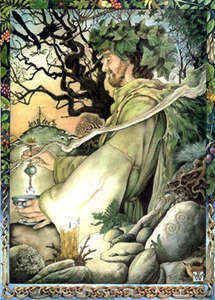Post by Senbecc on Jun 7, 2006 7:44:19 GMT -5
The Greek presocratic philosopher Empedocles, taught that "Philotês" and Neikos (love and strife, or more accurately according to some Affinity/friendship and Difference/disagreement, were the main causes of change and transformation in the cosmos, which Empedocles identified to Ares (fire) and Aphrodite (born of the sea representing the coolness of water) To the Greeks there were four classical elements, these of course being Fire (Hot and dry) Earth (cool and dry) Air (hot and wet) and Water (Cold and wet).
The major qualities of Fire and Water being warmth and coolness, which are the powers of separation and union. The following is a diagram of Greek elements and their qualities.

Love is associated with the Mixture (Krasis) in the Crater, as Strife is with enmity or separation (Ekhthros). Indeed, Empedocles (fr. 35) describes the mixing of the immortal Roots by Love and Strife (Cool + Warm = Water + Fire = Water + Wine) in terms reminiscent of the Crater: as they mixed, "countless types of mortal things poured forth" (my emphasis), a process described as an "onrush" or "stream" (hormê) of Perfect Love. Love and Strife are each responsible in Their own way for a "coming to be" and a "passing away": Strife creates Plurality by dividing the One, and Love creates Unity from the Many. A proper balance of both is necessary in an ordered cosmos.
en.wikipedia.org/wiki/Classical_elements#Classical_elements_in_Greece
www.cs.utk.edu/~mclennan/BA/AGEDE/Fire.html#LS
en.wikipedia.org/wiki/Empedocles
The major qualities of Fire and Water being warmth and coolness, which are the powers of separation and union. The following is a diagram of Greek elements and their qualities.

Love is associated with the Mixture (Krasis) in the Crater, as Strife is with enmity or separation (Ekhthros). Indeed, Empedocles (fr. 35) describes the mixing of the immortal Roots by Love and Strife (Cool + Warm = Water + Fire = Water + Wine) in terms reminiscent of the Crater: as they mixed, "countless types of mortal things poured forth" (my emphasis), a process described as an "onrush" or "stream" (hormê) of Perfect Love. Love and Strife are each responsible in Their own way for a "coming to be" and a "passing away": Strife creates Plurality by dividing the One, and Love creates Unity from the Many. A proper balance of both is necessary in an ordered cosmos.
en.wikipedia.org/wiki/Classical_elements#Classical_elements_in_Greece
www.cs.utk.edu/~mclennan/BA/AGEDE/Fire.html#LS
en.wikipedia.org/wiki/Empedocles



